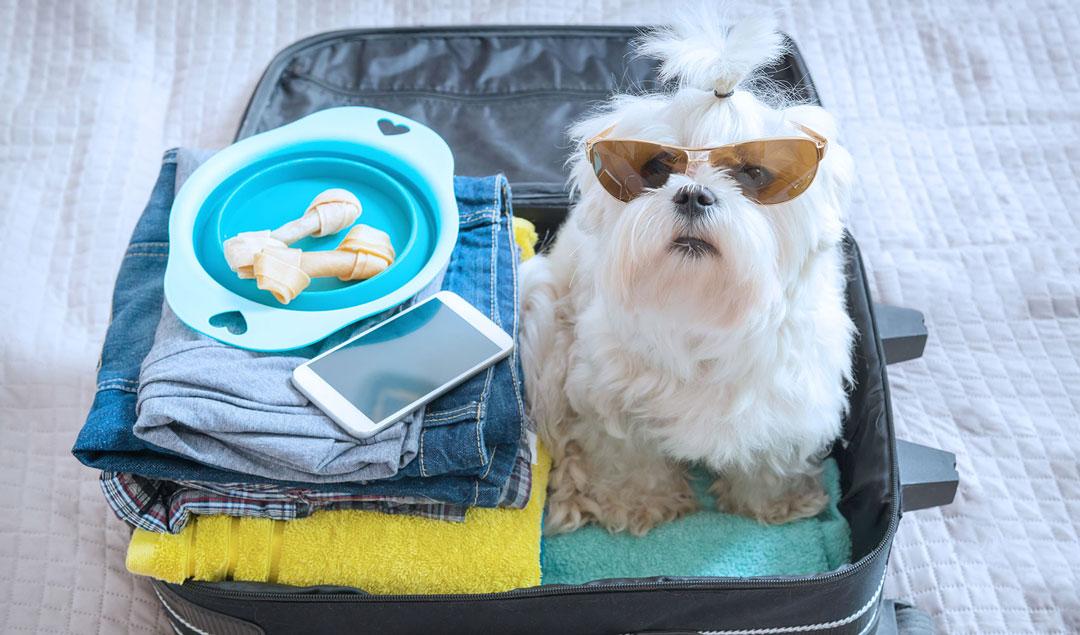Travelling abroad with your pet
Travel advice, documentation and preparation to ensure you and your pet can travel safely and without difficulty
Taking your cat or dog on holiday with you means you don’t have to be parted with your much-loved pet while you’re away, and it can avoid the worry of deciding who is going to care for them during your break.
Since Brexit there have been significant changes regarding pet travel to the EU, as well as Northern Ireland.
The main change is that you are no longer able to use pet passports issued in England, Wales or Scotland for EU travel and will instead require an Animal Health Certificate (AHC) issued by an Official Veterinarian (OV). Unlike pet passports, AHCs can only be used for a single journey. UK vets are no longer allowed to enter anything other than worming treatment into EU passports.
To ensure you have a smooth, stress-free trip, it’s important to plan ahead to make sure you have all the correct paperwork in place for your pet by the time you’re due to travel. It can be a complicated process, but the staff at Meridian Veterinary Practice will be able to help. The government also offers guidance and has phone and email helplines that you can contact.
Travel to Northern Ireland:
From 04/06/2025, owners can now apply for a Pet Travel Document (PTD) directly from the Government website at: https://www.gov.uk/apply-for-northern-ireland-pet-travel-document. It is free to apply and, once issued by the government, it lasts for your pets’ entire life. Your pet no longer needs a rabies vaccination or tapeworm treatment to enter Northern Ireland or travel back to the UK, but your pet must be microchipped. Each animal needs their own PTD.
Pets are not permitted to enter Ireland on a PTD and if there is any onward travel to the EU from Northern Ireland, you must have a valid AHC.
Travel to the EU:
When travelling to any EU country, your pet needs:
- An AHC, unless you have a pet passport issued in an EU country, with an up-to-date rabies vaccination that has been administered in the EU, with the rabies section stamped and signed by an EU vet.
- A microchip
- A valid rabies vaccination, at least 21 days before the AHC is issued.
- The AHC must be issued within 10 days of you leaving the UK
- An AHC is valid for one trip out of the UK and can be used for the return journey within 4 months of issue.
- Tapeworm treatment for dogs if you’re travelling directly to Finland, Ireland, Norway or Malta
If you are returning to the UK, you must see a vet in the country you are visiting to have a tapeworm treatment administered 24 – 120 hours before returning to the UK. This does not apply if you are returning directly from Finland, Ireland, Norway or Malta, without passing through any other EU countries.
These requirements also apply to assistance dogs.
Please give us plenty of notice to ensure that we can fit you in, as if we do not have available appointments, you will not be able to travel without it. Please note that whoever is travelling with your pet must attend the appointment in person. The AHC is ready to collect the following working day. Contact us if you have any questions.
Travel outside of the EU:
Different countries around the world have their own specific regulations regarding the import of pets, and many require a set of comprehensive tests and export health certificates (EHCs). Every country has different rules and it is the owners’ responsibility to meet these import requirements, and we strongly advise using a travel company for all non-EU travel. You can request export health certificates through the government website: https://www.gov.uk/export-health-certificates
The first step is to book an appointment with an OV at Meridian Vets to discuss your planned travel and required vaccinations and blood tests for your destination country.
OV66 ID checks for Australia:
Dr Si Keirle has OV66 accreditation and can provide ID checks for cats and dogs travelling to Australia. In order to reduce the quarantine period from 30 to 10 days on arrival in Australia, cats and dogs must have two separate identification declarations which must be conducted by two different OVs who do not work at the same practice. We are happy to see animals registered at different practices specifically for this service.



